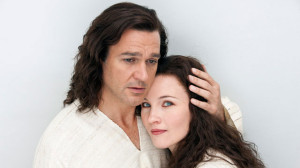Mary Magdalene gets a bad rap. Jesus’ constant companion is often remembered as a repentant prostitute, but there’s no real biblical basis for that tradition. In fact, aside from confusion with other women in the New Testament, there’s no reason to believe that she was any more a sinner than any other of Jesus’ disciples, other than a traditional discomfort with and suspicion of women in general. This depiction was further complicated by the Nag Hammadi library, a collection of ancient manuscripts unearthed in Egypt in 1945. Found in a large urn, these leather-bound collections of papyrus documents contained several alternate gospels that depicted Mary as a prominent disciple in her own right, not just some hanger-on. And now composer-librettist Mark Adamo, author of the popular contemporary opera Little Women, has taken it onto himself to set the record straight in song.
A world premiere commissioned and produced by the San Francisco Opera, The Gospel of Mary Magdalene draws heavily on these variant texts, to the point of having a 48-member chorus of what look like archeology students standing around singing textual citations for key scenes and quotations. David Korins’ set for the SF Opera premiere makes this connection to the unearthed text explicit from the start, depicting an archeological dig of ancient stone walls covered with scaffolding. According to the program, the seeming archeology students are actually modern seekers grappling with their religion’s attitude toward women, sex and the human body. (“So poisonous, this story!” they lament.) They thirst to know more about Mary Magdalene (“who was she, the Maaaagdalene woman?”), and she helpfully emerges from a cave and starts reenacting her life with Jesus, here called by his Hebrew name Yeshua.

But the story shown here is not one that many will recognize, because Adamo draws as much from imagination and speculation as from the Gnostic gospels. It opens with Mary summoning her lover, who appears to be Yeshua, and they canoodle until they’re caught in the act by… his wife! Wait, what is this? Interestingly, Adamo’s version conflates Mary with the adulterous woman whom Jesus saved from being stoned to death with his famous zinger, “He that is without sin among you, let him first cast a stone at her.” She doesn’t have much patience with his gentle scolding afterward, but she’s grateful for him saving her life, so she agrees to come hear his preaching.
There’s a scene of competing preachers spouting seeming nonsense, inevitably reminiscent of Monty Python’s Life of Brian, and Nathan Gunn’s Yeshua doesn’t particularly stand out from the pack aside from his rich baritone and the fact that everyone seems to be politely paying attention to him. In fact, Mary soon challenges him on a message that seems to be the same old fire-and-brimstone thing she’s heard a thousand times before. Yeshua is charmed by her active and uncompromising mind, and she sees something special in him that she wants to explore. This is despite the fact that his own mother warns Mary off in no uncertain terms, saying that he’ll only hurt her and destroy her. “Run, run like the wind!” sings Miriam (better known as the Virgin Mary), feelingly portrayed by soprano Maria Kanyova, who played Pat Nixon in SF Opera’s Nixon in China last year.



